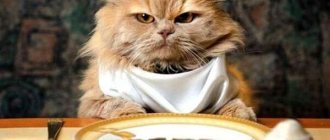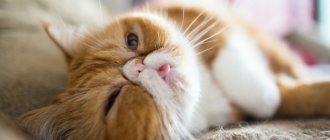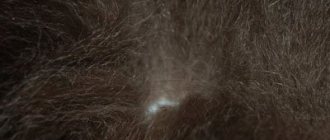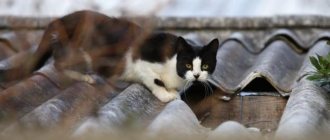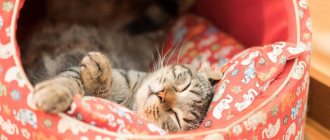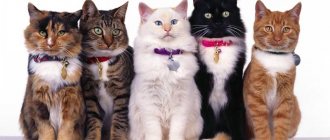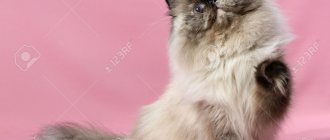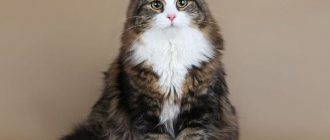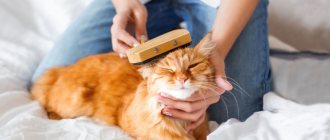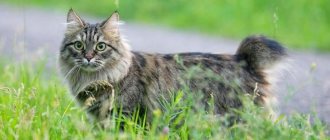In the material, we analyzed the character of cats and the features of cat psychology, how characters differ depending on the breed. You will also learn what types of cat temperaments there are and how to choose the best one for your owner.
Each cat is independent, rebellious, and has a unique character. Some of them are very gentle, love to spend time with their owner, constantly purring and rubbing against their legs. Others, on the contrary, love loneliness more, and the manifestation of tenderness is simply unacceptable for them. How a cat will behave in a family depends on its character. How then can you understand what the character of cats will be? It all depends on many factors.
Cats
Cat psychology
The main character trait that all animal psychologists highlight is independence. But willfulness is far from a minus of representatives of this family. It is for these qualities that these animals are valued by so many people, which is why they have inspired artists, poets for centuries and continue to do so to this day. Cats are soft, elegant, graceful, which is why spectacular women are so often compared to them.
Despite the fact that these animals are very freedom-loving, they are capable of becoming very attached to their owner. It is thanks to independence that their love becomes much more valuable. Animals easily feel the mood of the owner and know how to adapt to him.
On the other hand, fluffy cats are often associated with comfort, warmth, and well-being. Some owners are not ready to put up with waywardness and want to be greeted at home by a warm bundle of happiness. Such fluffy creatures also exist. They are ready to purr all day long, rub against your legs, love to hug and caress.
Cat and man
There are very active animals that happily play with their owners and other animals. But not everyone is ready to tolerate excessive playfulness and small pranks.
When choosing a pet, it is worth understanding what kind of cats there are by nature. Everything is exactly the same as in a love relationship: in order to love each other, you need a good connection, the same worldview.
Rex
Hyperactive representatives of the feline world do not sit still for a minute. Their pirouettes will leave no one indifferent. Like trapeze artists, they jump from one horizontal surface to another. Flexible and friendly. They have hypoallergenic wool, which looks like astrakhan fur. If danger arises, they are able to protect themselves and their owner. Fearless, but not aggressive.
Characters of cats of different breeds
Animal psychologists, having conducted a large number of studies, have revealed the dependence of the character of an animal on its breed. Some breeds are more independent, others are very active, and others are gentle.
But it’s worth noting right away that every rule has its exceptions. Character is influenced not only by breed or color, but also by upbringing, attitude from people, and the general atmosphere in the house. First of all, like the owner, like the pet.
Sociable and sociable
Sociable pets are perfect for open, sincere owners. If you often have strangers in your house, then such a cat is the ideal solution. Such animals easily make contact, are not afraid of new people, and show equal interest in all family members. Sometimes such behavior may seem inappropriate, since they tend to show excessive love for their owner: they do not move a step, they constantly sit on the lap, under the feet.
In addition, they are very jealous, often not ready to share their owner with other pets or even with family members.
Sociable cat
If a kitten has been accustomed since childhood to the fact that new people always appear in the house, then this will soon become the norm for him. When he grows up, he will not hide under the sofa at the sight of a stranger. It can be said that this character trait can be developed in almost all breeds.
But still, there are some breeds that are more open to communication and learning something new. Let's list just a few of them:
- Bengal. This breed is the result of crossing domestic and wild breeds. They are very affectionate, active, do not require special care, very friendly, and intelligent. Bengal cats look very much like small tigers, which is what makes this breed so beloved.
- Siamese. A characteristic feature of this breed is a loud voice and an incredible desire to communicate with people. Communication for such pets is the same need as water or food. They perfectly grasp intonation, and therefore very easily get offended by the owner if he raises his tone at them.
- German Rex. The German Rex is an incredibly intelligent breed. They have a unique ability to create comfort and warmth in the home. The owners assure that an understanding and loving breed simply does not exist. They love to communicate and play with people, but if a person does not have time, then they will be happy to occupy themselves.
- Canadian Sphynx. Many people do not understand what the value of this breed is, but in vain. Sphinxes are very attentive to their owners, they love to be near them and give them their warmth. Sphinxes tolerate loneliness very hard, so you should not leave them alone for a long time.
You shouldn't get a sociable pet if no one is home all day. The animal will be very sad, lonely, and may become depressed.
Balanced and calm animals
Balanced, calm animals have a very strong nervous system. They never show aggression and even tolerate excessive attention from people. They are perfect for families with small children, as they will calmly tolerate all the child’s pranks without harming him.
But don't abuse your patience. If you cause pain, even not on purpose, the animal may scratch, bite, or even be offended.
Calm cat
Such animals do not pester people, but if they are picked up or offered to play, they will be docile and gladly take the initiative.
Balanced, calm breeds include:
- Russian blue. Representatives of this breed are not capricious and almost never lose their composure. They love to spend time with their family, but prefer to stay on the sidelines and wait for attention from their owner.
- Siberian. Cats have a well-developed sense of self-esteem, but enjoy spending time with their owner and playing with children. They are sociable, calm, reserved, quite fearless, but wary of strangers.
- Burmilla. An aristocratic cat with a heightened sense of loyalty. They really need warmth and love. Even adults love to play, but when they notice that the owner is busy, they will not irritate him, but will wait for a more convenient opportunity.
With a proud and domineering temper
Oddly enough, many subconsciously choose animals with just such a character. If you decide to have a proud, rebellious cat, then you will have to get used to taking her opinion into account, as she becomes a full member of the family.
Such animals are suitable for busy people. A proud, independent cat does not particularly need attention from others. But if another animal appears in the house, she will do everything possible to make its existence unbearable. For the same reason, it is better not to have powerful animals for families with children.
Dominant breed
The most powerful, proud breeds and their characteristics:
- Maine Coon. They are very friendly, calm, but will not follow people’s lead. The authority for them is only one family member - the owner. Only after him will they follow on his heels. They tolerate loneliness well, are not inclined to play pranks, but because of their size they are able to sweep away everything in their path.
- Japanese Bobtail. Bobtails are simply unmanageable, especially as children. They may truly love their owner, but they are not required to spend most of their time with him, watching TV or playing. Bobtails prefer to walk on their own. They can spend more than nine hours a day alone.
- British Shorthair. Despite her gentle disposition and manifestation of love for her owner, the British woman will not unquestioningly follow all orders. They cannot stand rude tones and are often offended. Grievances may not be forgotten for a long time.
British
Smart, calm and balanced - that's all about cats of the British breed. They do not like intrusive caresses and hugs. If they are not ready for games and cuddles, they will immediately slip away from the hug. At first, the pet will observe people and how they treat him. In large families they do not choose favorites, but treat everyone equally. Capable of mutual affection. They are not ready to spend all their time next to a person; they need solitude and peace. They are loyal to other animals. In case of dissatisfaction, they look for a secluded place where they remain until their mood changes.
Types of cat temperament
The behavior of an animal is influenced not only by its breed, but also by its temperament. That is why some kittens try to express themselves, actively make contact when people come for them, while others hide in the most secluded places.
Like humans, cats have 4 types of temperaments:
- Choleric;
- Sanguine;
- Phlegmatic person;
- Melancholic.
Cholerics
Cholerics are incredibly active: they love to go out for walks, frolic at home, and run from corner to corner. But if raised incorrectly, excessive activity can turn into uncontrollable anger.
But it is from choleric people that smart, obedient pets grow up, who, if necessary, can stand up for themselves, for their owner.
Aggression
When raising choleric people, it is worth abandoning cruel punishments and shouting at them. They do not know how to perceive aggression; they respond to it in the same coin.
The ideal solution for cats of this type of temperament is the opportunity to splash out their energy. A large house or “cat sports complex” is ideal for this.
Sanguines
Sanguine cats, on the contrary, are very calm and reserved. They are ideal for a quiet, homely family life. Such animals get along well with people and will not mind playing sometimes. They value both solitude and spending time together.
Despite their calmness, they cannot be called cowards. They always try to explore new territories, they are the first to make contact, and will not hide in a secluded corner at the first opportunity.
Calm cat
Sanguine kittens are very strong, but not the largest. As a rule, they are the leaders among their brothers and sisters. Sanguines meow little, but purr with pleasure.
Phlegmatic people
Representatives of this type of temperament are a little inhibited, but very calm and flexible. They can sit in one place for hours, almost not reacting to what is happening around them. Phlegmatic people rarely make contact first, which means a person must take the initiative himself.
It is important that such cats do not lie too long and become obese. Most often, it is phlegmatic people who suffer from excess body weight. Therefore, the owner should provoke the cat to move as often as possible, wind it up, and play. Despite his lethargy and laziness, the cat is unlikely to refuse to play.
Animal phlegmatic
Melancholic people
The most sensitive, unbalanced, touchy type. Such animals are very jealous, and it is almost impossible to educate them, since it requires a lot of patience and time. This is a cat with a very difficult character.
You should always talk to melancholic people quietly, without irritation. If they require attention, then you need to put everything aside and take care of the pet. Melancholic people are very talkative and love it when people talk to them.
It can be especially difficult with cat mothers, as they quickly become attached to their children and have a hard time parting with them.
Offended cat
Does character change after castration and sterilization?
Despite numerous claims that spaying or neutering somehow affects a cat's character, this is not the case.
The fact is that when animals lose the ability to reproduce, they lose this uncontrollable desire to get close to a representative of the opposite sex. They are no longer eager to go outside, they become softer and more flexible.
But this does not in any way affect the character or temperament as a whole. No large-scale changes in behavior should be expected.
Persians
This breed is chosen for its unique external characteristics. After the first acquaintance, it becomes clear that in addition to their stunning appearance, Persians have an easy-going character and are capable of limitlessly loving their owner. These four-legged animals behave arrogantly towards strangers. When they are alone with “their person,” they are playful, affectionate, and devoted. They love stroking and do not emit heart-rending meows. They do not cause trouble, but it is worth paying attention to brushing the coat every day.
How to choose the perfect cat
It will not be possible to choose an ideal, since each owner has his own idea of the ideal. For some, the most important thing is a kitten’s playfulness, for others – complaisance and learning ability.
The most important advice that can be given to a future pet owner is quite simple. You need to follow your inner instincts and choose a kitten that you like. Even if you make a mistake with your choice, your character can always be corrected by upbringing and showing care and love for the animal.
Cats of different breeds
The director of the pet salon, Natalya Khabarova, will talk about how to determine temperament and understand what kind of character a particular cat may have.
Maine Coon
Good-natured people of large sizes, literally and figuratively. They are attached to people and want to constantly take part in the life of their owner. They love to take water procedures with people. These big furry cats love to go for walks. They are relaxed about leashes and friendly towards dogs and cats of other breeds. They spend most of their time on their owner's lap. Big good people are undemanding and unpretentious.
Angora
Angora cats delight not only with their snow-white fur, but also with their optimism. They are ready to play and purr all day long and are affectionate. They are able to imitate human speech, emitting an expressive purr. They often get bored with the desire to be close and rub against the owner.
If you decide to get a kitten, do not try to take the baby. Wait until your baby is 3 months old. At this age, the character traits of the four-legged furry are already determined.
Hairless
Don Sphynx
Don Sphynxes are affectionate, non-aggressive, and playful. They have somewhat dog-like habits, while remaining unobtrusive and tactful.
Breed characteristics
- Hairless cover;
- medium sized body;
- big ears; expressive almond-shaped eyes;
- pronounced eyebrows and cheekbones;
- long graceful paws.
Canadian Sphynx
The Canadian Sphynx is the first recognized breed of hairless cat. All Sphynx cats are characterized by increased body temperature and the ability to tan. They become very attached to their owners. These creatures need constant communication. Canadians are very smart and learn new things easily. They are friendly with absolutely everyone and get along great with children.
Breed characteristics
- Hairless cover;
- dense muscular body;
- folds on the skin;
- the forelimbs are shorter than the hind limbs;
- large wide ears with rounded tips.
Petersburg Sphinx
Of all the types of sphinxes, the Petersburg, or Peterbald, is the most graceful. He looks more like an oriental cat than other sphinxes. The Peterbald is a companion cat; he does not like to walk on his own. Thanks to the presence of Siamese-Oriental cat breeds in the pedigree, the Peterbald is very active. His character retains all the traits characteristic of the ancestors of other breeds: lack of aggression, sociability and love.
Breed characteristics
- Hairless cover;
- thin, invisible undercoat;
- small wedge-shaped head with huge ears;
- blue or green eyes;
- long nose, straight profile.
